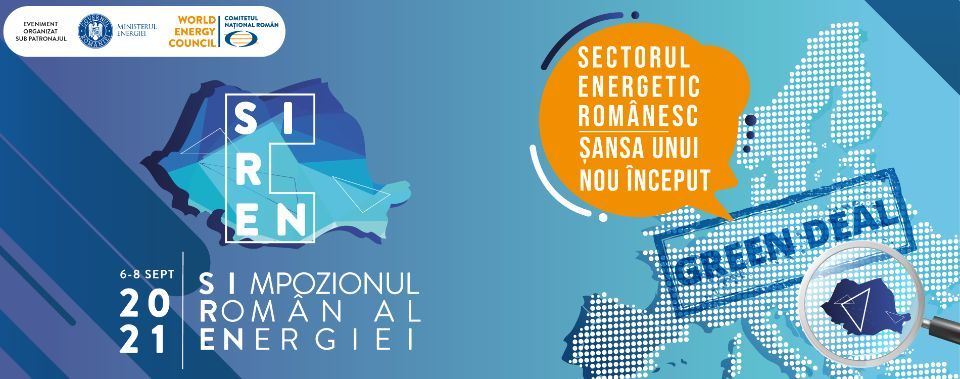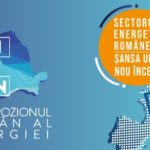SIREN 2021: Main statements of the event in Day One

The first edition of the Romanian Energy Symposium – SIREN 2021, with the theme “Romanian Energy Sector – The chance for a new beginning”, organized by the Romanian National Committee of the World Energy Council (CNR-CME), under the auspices of the Ministry of Energy and National Authorities field, was opened on September 6, 2021.
The opening session of SIREN 2021, hosted by Iulian Iancu, president of CNR-CME, was attended by: Virgil Popescu – Minister of Energy, Tánczos Barna – Minister of Environment Bogdan Chirițoiu – member of the ACER Board and President of the Competition Council, Radu Bădiță director of ANREC
In his speech, Iulian Iancu, president of CNR-CME, stressed the need to organize SIREN 2021, given that energy is Romania’s chance for a new beginning, and to meet the growing challenges, we need a real dialogue and directly. “Energy has risen to the top of global issues,” said Iulian Iancu, and continued: “The World Energy Council has introduced the concept of the energy trilemma, updated regularly, based on three important vectors – energy security, energy poverty, climate change. . Not enough attention has been paid to these issues, and as such, unprecedented things have happened lately that have caused many imbalances: rising energy prices, the emergence of a new energy mix, Grean Deal, etc. All this makes us analyze the opportunities we have, based on four pillars: 1) the focus and injection of renewable energy sources in economic, agricultural, etc., 2) the intention to replace the transition fuel (natural gas) with hydrogen , 3) support through state aid and subsidies for biomass so that the ecosystem is not affected 4) paying more attention to energy efficiency, primarily related to the new wave of building reconstruction, according to the new set of regulations to be issued this month this by the EU. The key to solving some of the problems we are currently facing is hydrogen, already defined at EU level, whose quality will be certified, and the most important target will be that 40% of primary energy will have to be from sources. renewable until 2030 ”.
In his speech, Bogdan Chirițoiu, member of the ACER Board and chairman of the Competition Council, said that we have a European energy market and, as such, European developments are also felt in our country. “ACER checks the situation of prices and competition in the internal market, but it is not perfect. It feels more like a regional market, not a European market and that is why new investments in the sector are needed. There are some suspicions about how the Romanian market works in terms of suppliers and consumers. The key element is related to customer migration. This migration must not be prevented and rigorous, long-term investigations are needed here. “
At the end of the opening session, Radu Bădiță, director of DGSRCET-ANRE, stressed that ANRE is in the center of attention being involved in resolving consumer grievances and that next week an order will be submitted for public debate to know the available networking capabilities and facilitation promoting renewable energy sources.
The Opening Session was followed by two Working Sessions.
The panel of the first working session, “Energy transition in Europe: from Green Deal requirements to the optimal energy mix in Romania”, was moderated by Iulian Iancu, president of CNR-CME and consisted of: Bende Șandor – president of the Commission for Industries and Services, Chamber of Deputies, Eric Stab- director of Europe & AMEA, CEO of Operational Optimization, interim CEO of Northern, Eastern, Central and Southern Europe, president & CEO- ENGIE Romania, Elena Popescu-general manager, Ministry of Energy, Carlo Pignoloni- president RWEA and CEO & Country Manager of ENEL, Corina Popescu- CEO of Electrica, vice-president of EURELECTRIC, Bogdan Toncescu- President of Transelectrica.
Bende Șandor, chairman of the Committee for Industries and Services-Chamber of Deputies, appreciated the existence of a change in the concept of energy consumer, considering the Green concept and said: “The energy mix is convenient and satisfactory for Romania. But the demand for energy will increase, especially for the demand for electricity: first of all e-mobility. Consumption would increase 120 times more just for transport. For PV, an area of 80% of the Romanian territory should be added, to which are added the transmission and distribution networks. The challenges are great, the energy strategy is being finalized, and the pandemic has taught us that we must have what we need, we cannot rely only on others.
For his part, Eric Stab said that the Green Deal is a revolution and an opportunity for Romania, but that substitutes for fossil fuels must be identified. “I understood the importance of environmental measures, the fact that the transition is irreversible and that natural gas is important in the transition. The process is time consuming and can gradually replace coal. The gas market can be invigorated by the appearance of offshore gases. Gases from other sources can also be used: green hydrogen, biogas. Appropriate policies are needed to use the existing infrastructure. Consumers need to adapt and learn to consume more responsibly, more efficiently. In addition, large IT companies have begun to buy green energy for a long time, helping with the transition. Romania is well positioned for the Green Deal and it is important to invest in decarbonization measures. There is a huge potential for biogas, but we need a regulated framework for promotion “, concluded Eric Stab.
Elena Popescu, director general of the Ministry of Energy, stressed that Romania is in the process of implementing a new European legislative package: Fit for 55. “There is a need for greater accountability of all factors. Directive 944 has been transposed, but it is desired to rewrite the energy law. The modernization fund helps the technological reform, it is being worked on, and the first projects will probably be approved by the end of this month. At the technical level, the Ministry of Energy is ready, but there is a lot to do throughout the economy. There is money in this fund, with sectoral targets. The Integrated Energy Environment Plan is the new road map of the country, and it must be reviewed next year, Elena Popescu mentioned.
Carlo Pignoloni, President of RWEA and CEO & Country Manager of ENEL, highlighted the fact that the energy market has changed not only in Romania, but also in other EU countries. “We do not know what will happen next by promoting renewable energy sources. We are talking about a revolution that requires strong commitment, especially in the case of Fit for 55. We need to do many things, project the future correctly, involve the consumer and educate him, especially in a fully liberalized market. The involvement of prosumers involves the digitization of electricity networks “, said, among others, the president of RWEA.
Corina Popescu, CEO of Electrica, presented Romania’s goals, namely competitiveness and digitalization, but also spoke about energy storage, an essential element that solves the problem of migration of plants operating on renewable energy sources at the base of the load curve. “Electrica has ambitions
and in investments in production. We need to learn to access European funds quickly. It is important to turn the conclusions of any event into facts “, Corina Popescu underlined.
At the end of the panel, Bogdan Toncescu, President of the Transelectrica Directorate, said that 20 projects of national importance have been established at Transelectrica (Dobrogea and Banat), including increasing cross-border capacity and stressed: “There is liquidity on the market and it is discussed and with the Ministry and with financial institutions. As internal measures, we mention the rethinking of the contracting strategy and the efficiency of the internal processes. For the integration of off-shore capacities – the cable project in parallel with the BRUA pipeline ”.
During the second Working Session, “Government programs and investment policies in the energy transition in Romania”, moderated by Ioan Dan Gheorghiu – vice-president of CNR-CME, presentations were given by: László Borbély- state counselor at the Cabinet The Prime Minister, the coordinator of the Department of Sustainable Development – General Secretariat of the Government, Nicolae Havrileț – advisor, Ministry of Energy, Valeriu Binig – chairman of the Committee for Energy and Environment, AMCHAM, Bogdan Badea – chairman of Hidroelectrica, Cosmin Ghiță – general director of Nuclearelectrica.
Topics discussed at the second Working Session focused on: energy security, the need for a circular economy strategy, the state of the use of renewable energy sources, encouraging investors for hydrogen technologies in a pilot gas blending project naturally, the need to use the potential of the Black Sea, the importance of offshore law for the authorization of projects as soon as possible, the improvement of energy law and possibly the elaboration of a new law, the need for better regulation, predictability, diversification and better market understanding . The robustness of nuclear energy and highly specialized workforce was also highlighted, as well as the updating of the documentation for Units 3 and 4, in order to think of an appropriate financial scheme. The flexibility of electricity generation sources is an important objective in the development of the energy system.
The discussion panel of the second Working Session consisted of: Cătălin Stancu – associate senior expert, Horvath & Partners, Florin Pop, general manager of Energobit, Viorel Gafița- president of Romelectro, Sorin Elisei- director, Risk Advisory, Energy & Sustainability- Deloitte Consultancy, Sorin Petre- partner, PwC Romania
The members of the Discussion Panel stressed the need for political stability. It was also mentioned that PNIESC is a “proxy” for the energy strategy, which does not have a central element: what do we want to achieve at the end of the 10 years? Not only European funds must be used, but the private sector must be involved. You need investment, but to find investors you need predictability and profitability. Long-term decisions are also needed, and long-term contracts can help.














